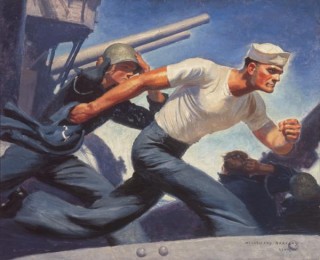The Navy’s future leaders should go to General Quarters with so many commanding officers being in the headlines lately.
A young submariner once wrote, “It is integrity that bonds the crew of a submarine so tightly together that when faced with any circumstance, each individual can trust his shipmate to meet the needs of the moment.” This anonymous sailor went on to make the comparison between integrity in professional conduct and the physical integrity of a ship. 1 It seems that officers in today’s Navy need to extend this analogy to address integrity in personal conduct.
Now-retired Vice Admiral Thomas Kilcline brought the issue of personal integrity to the fore in 2010 through a concept called “The Whole Sailor.” 2 Unfortunately, the rate of personal misconduct, specifically among commanding officers (COs), has only increased. In the Summer 2012 Naval War College Review , Navy Captain Mark Light sought to bring attention to integrity problems at the command level through an analysis of COs who were “detached for cause (DFC)” from 1999 to 2010. He pointed out that in 2010, 13 DFCs were due to personal misconduct, compared with a total of 29 in the prededing decade. Since that analysis concluded in 2010, 25 COs (not counting the most recent incident involving the command of the USS Vandegrift [FFG-48]) have been fired for integrity related incidents. 3 Whether or not these numbers represent a real deterioration of integrity among COs—or just heavier focus on personal conduct from senior leadership—a seemingly never-ending stream of embarrassing headlines (“Submarine commander sunk after allegedly faking death to end affair”) and a desensitized tone from the public (“Navy Skippers: The Gift that Keeps on Giving”) are unquestionably cause for alarm. 4
To be fair, senior Navy leaders have not hesitated in taking immediate action. For one, the Navy has been forthright regarding the behavior of its COs. It is easy to find articles about COs being fired for personal misconduct, but it is difficult to find credible instances of the Navy covering up such behavior. Meanwhile, strict new requirements for screening potential commanders, such as written tests, oral boards, and even reviews from peers and subordinates, are being enacted throughout the Fleet. 5 Clearly, the Navy is willing to fight to preserve the standards to which it holds its COs.





